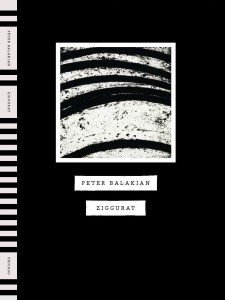In his first book of poems since his highly praised June-tree: New and Selected Poems 1974-2000, Peter Balakian continues to define himself as one of the most distinctive voices of his generation. Exploring history, self, and imagination, as well as his ongoing concerns with catastrophe and trauma, many of his new poems wrestle with the aftermath of September 11.

About Ziggurat (University of Chicago Press, 2010), prize-winning poet Carolyn Forché has written: “With characteristic originality, Balakian finds his echoing motif in the construction of the first great skyscraper, the Ziggurat at Ur, and this gives his epic poem, ‘A-Train/Ziggurat/Elegy,’ a historical depth I have found nowhere else in American poetry in recent years. What Balakian has achieved here is a brilliant assimilation of the historical, philosophical, political, and psychological.”
As a young man in the late 1960’s, Peter Balakian was a mail runner in downtown Manhattan, working in and around the building site of the World Trade Center as the towers slowly took shape and began to fill with people and businesses. And, like so many others, he watched in mute horror on September 11 as they fell. In his long poem “A-Train/Ziggurat/Elegy”—which forms the centerpiece of his new book, Ziggurat—he weaves the story of their rise and fall into a complex personal and cultural account of life and loss in New York in the final decades of the 20th century. Frightening and moving by turns, the poem anchors a book that ranges widely geographically and culturally, from the ruins of the Bosnian National Library and tidings of war to the relationship between high and pop art, music and memory, catastrophe and commemoration—all shot through with the empathy and attention to language that will be familiar to readers of his memoir, Black Dog of Fate, and his best-selling account of the Armenian Genocide, The Burning Tigris.
Essayist and literary critic Sven Birkerts, in turn, has written: “Ziggurat ingests calamity and dissolves it into an exhilarating rhythm and image, pushing the language until it feels like it’s breaking into something new. This is how idioms change, advance. Balakian renders scenes and at the same time enacts the sensibility being breached and affected—September 11 is just shorthand for our new magnitudes of violence and dissociation. The frames of contemporary life, and our recent history, fit together because they have been brought to account in the self of the poet. The work aims to reveal the human capacity to integrate and, after hard passage, transcend.”
Peter Balakian is the Donald M. and Constance H. Rebar Professor in Humanities and professor of English at Colgate University. He is the author of five books of poems including June-tree: New and Selected Poems 1974-2000, and three prose works, including The Burning Tigris: The Armenian Genocide and America’s Response, a New York Times best-seller, and Black Dog of Fate, winner of the PEN/Albrand Prize for memoir. His work has been translated into a dozen languages.
For information about Peter Balakian’s national reading tour, visit www.PeterBalakian.com.


i cannot wait to read this!!!!